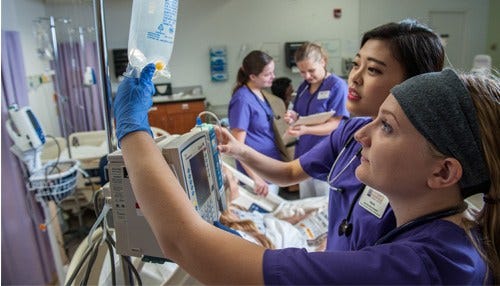University of Evansville Institute Targets Local Health Issues
 The university says the institute will put the "UE brand" on public health in the Evansville area.
The university says the institute will put the "UE brand" on public health in the Evansville area.
Subscriber Benefit
As a subscriber you can listen to articles at work, in the car, or while you work out. Subscribe NowSouthwest Indiana shares the same health burdens as the rest of the state, such as high rates of infant mortality and chronic disease, but local public health leaders say that specific region also bears the weight of poor air quality. Combatting such local health issues is a key goal as the University of Evansville launches its Institute for Public Health.
“Southern Indiana has some major super-polluting coal-burning power plants, and the air quality in this region of the state is quite terrible,” says UE Institute for Public Health Director Dr. William McConnell. “The institute will hopefully play a role in helping build evidence to support sound policy to keep the environment safe, but also respect the culture. There are a lot of coal mines, and people feel very strongly about [the issue]. The institute can serve as a mediator between public health needs, while at the same time, respecting the economic and cultural needs of the people who live there.”
McConnell says the small liberal arts school, which is known for its programs in the health sciences, wants to “put the UE brand on public health in the Evansville area.”
“All of the allied health sciences have lots of clinical time in their training, but for public health students, the community is their clinic,” says McConnell. “The institute is a forum for the community, students and faculty to all come together to collaborate.”
While just a virtual space as it launches, the institute will be the nerve center to arrange opportunities for students “to really get their hands dirty in public health” and faculty to expand research efforts.
“UE faculty, along with faculty at the Indiana University School of Medicine-Evansville and the University of Southern Indiana, can come together to do research and help community organizations with whatever projects they might need help with,” says McConnell. “Community organizations frequently need a lot of help; public health, especially, is often under-resourced and under-staffed, so it can be a symbiotic relationship.”
Providing manpower for community organizations will extend beyond UE students in health programs. McConnell plans to “leverage the liberal arts strength at UE” and involve a long list of disciplines.
“Too often, public health doesn’t do a great job of explaining its return on investment. I think we’d all agree an ounce of prevention is worth a pound of treatment, but a lot of times, we focus too much on the treatment,” says McConnell. “With the high rates of chronic disease in southern Indiana, we need to be more focused on things we can do upstream. Folks in business economics can help us with the marketing piece of public health campaigns and the justifications for why we might rollout certain public health programs.”
McConnell believes students studying ethics could examine bio ethics and how the public health sector conducts surveillance to obtain population health data, or performing arts majors could help public health students learn how to deliver a persuasive message.
McConnel believes the institute, with its roots in a liberal arts school, will provide a richer foundation for public health projects. Launched earlier this spring, the institute is putting an emphasis on building relationships.
“Public health happens in very siloed places sometimes; the left hand doesn’t know what the right hand is doing a lot of time,” says McConnell. “I hope [the institute] can be a forum—perhaps in the future, a brick and mortar forum—for people to understand what’s happening in the community. It’s about bringing people together who need each other’s help and building better collaborations.”
McConnell says students are currently partnering with the Vanderburgh County Health Department on a project addressing infant mortality.
McConnell says the institute will increase research that “doesn’t fall into traditional categories.”
